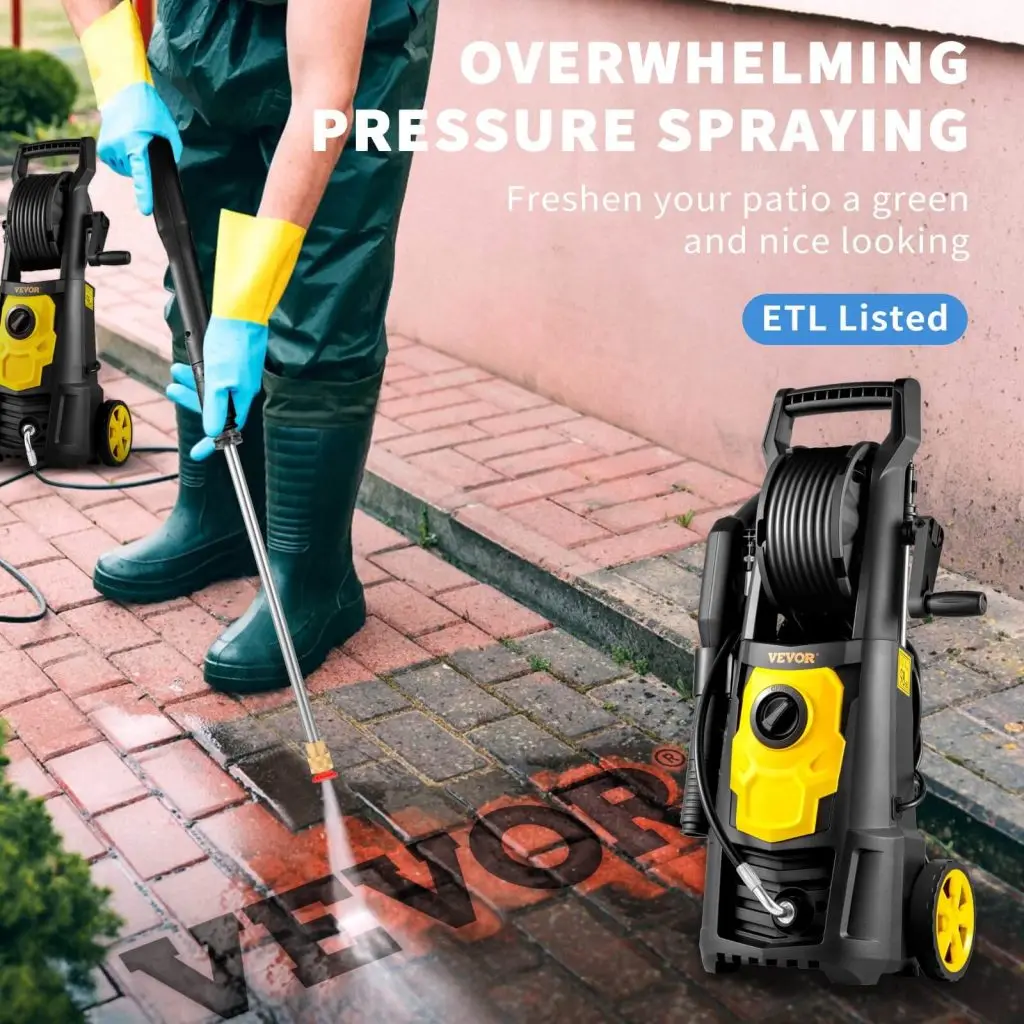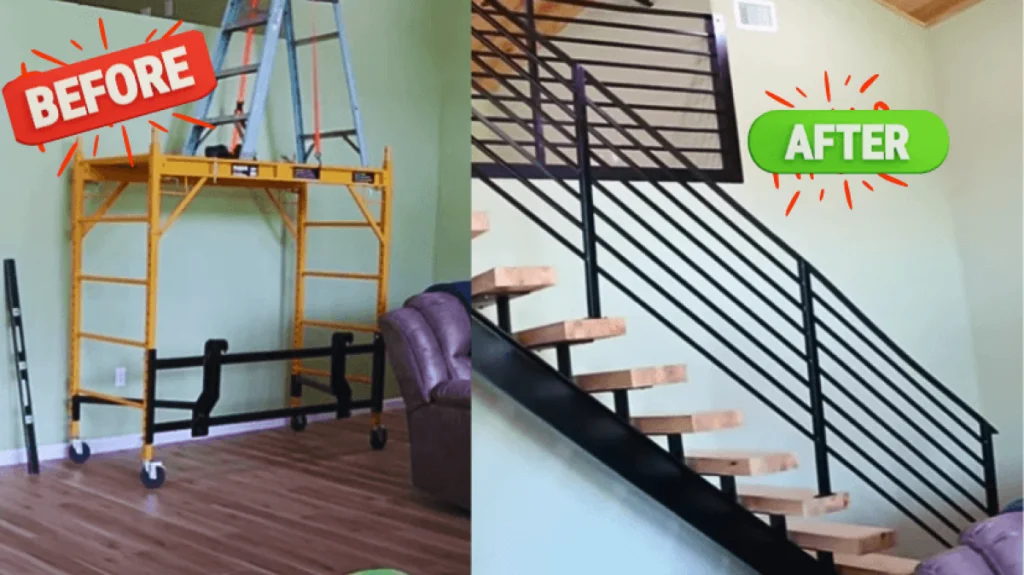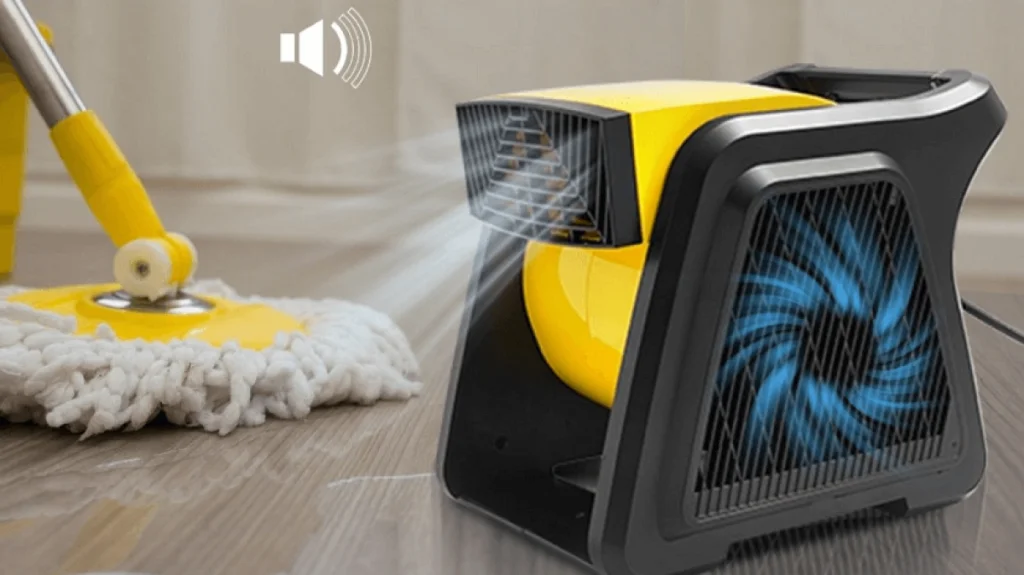Are you ready to breathe fresh life into your outdoor areas? Whether your yard is looking worse due to wear, the decking has moved past better days or unyielding blemishes have besieged your driveway, a power washer could be the perfect solution you need.
Power washing is a cleaning technique that sprays high-pressure water to remove dirt, grime, mold, or even loose paint from surfaces and objects around the home. Beyond boosting a home’s curb appeal, power washing also helps to prevent frequent wear and tear and prevent long-term damage. Additionally, power washing saves users time and energy that using alternative cleaning methods would have claimed.
The rest of this blog provides a step-by-step guide on how to power wash a driveway. It also includes helpful aftercare tips plus top power washer recommendations for long years of quality and effective service.
Table of contents
- What You Need to Know Before You Power Wash a Driveway
- Step-by-Step Guide to Power Wash a Driveway
- Common Mistakes to Avoid When Power Washing Your Driveway
- How Often Should You Power Wash Your Driveway?
- Benefits of Using VEVOR Power Washers for Driveway Cleaning
- Aftercare Tips for Maintaining Your Driveway Post Power Washing
- Conclusion
What You Need to Know Before You Power Wash a Driveway
The first section in the post details power washing basics you need to know before trying out the technique on your driveway. It explains what power washing a driveway means, plus how to choose the right power washer for your DIY cleaning projects.
What is Power Washing and How Does It Work?
Power washing is a cleaning technique that uses high-pressure water spray to eliminate stubborn stains like grime, mold, salt, grease, and loose paint from surfaces and objects. Power washing a driveway is a common choice among homeowners who want to save lots of time and energy cleaning up the area.
Many people assume power washing driveways means the same thing as pressure washing. However, while both processes look similar, they have one key difference: heat. When you pressure wash a driveway, you’re leveraging high pressure in output water toward taking out the stains. On the other hand, a power washer uses heated water under the same conditions to accomplish the same task.
The difference between both methods becomes apparent when cleaning spaces with tough grime like grease or mildew. Using heated water makes your cleaning experience easier. That said, power washing cement driveways or other surfaces like cement that can withstand heat is recommended.
Choosing the Right Power Washer
Using the right equipment is crucial in ensuring stubborn stains leave without causing any damage to the property. If you’re considering the appropriate equipment for your next driveway power wash, consider getting a pressure range of 3000 to 4000 PSI (pounds per square inch).
Thankfully, you could either rent professional driveway power wash equipment or purchase a quality power washer from VEVOR for guaranteed long years of excellent use. You also want to consider your preferred GPM rating range. A GPM rating is referred to as ‘rinsing power’: the higher your power washer’s GPM, the quicker you can wash surfaces clean. Power washers range between GPMs of 2.2 to 10.
Recommended For Your Project
Step-by-Step Guide to Power Wash a Driveway
Next on how to power wash a driveway, we dive into three major steps to complete your next driveway cleaning project. We begin from outlining the preparation phase to explaining how to apply a suitable cleaner toward completing a proper pressure wash.
Step 1 – Preparation: Clear and Inspect the Area
Take out vehicles, toys, debris, and other obstacles from the driveway. Consider sweeping away loose dirt and debris using a broom and follow through with a thorough rinse from your garden hose. Also, inspect the driveway for cracks or damage that could impair the cleaning process. That way, you can ensure your DIY driveway power wash yields optimal results.
Step 2 – Apply a Suitable Cleaner
If the power water permits a detergent dispenser, fill it up with the appropriate cleaner or create a soapy solution and apply it evenly across the driveway’s surface. Think soda/detergent in removing grease from concrete surfaces, or vinegar/baking soda if you prefer natural cleaning solutions.
When cleaning driveways with asphalt surfaces, dish soap, powdered detergent, baking soda, WD-40, or oven cleaners can effectively eliminate the tough stains. Avoid using too much pressure or strong chemicals when cleaning a driveway with brick surfaces. Detergents can eliminate grease (and related) stains from your brick surfaces while a bleach mixture is ideal when cleaning mold, mildew, and moss from brick walls.
Step 3 – How to Pressure Wash Driveway Properly
The last phase involves practical steps on how to pressure wash the driveway, alongside other helpful techniques. Begin slowly, pressuring washing from about 2-3 feet from the surface. Next, gradually inch closer until you spot the optimal distance to effectively pressure wash the driveway, without causing any damage.
Move the wand through even and overlapping passes for a uniform effect. Remember to avoid lingering in one spot for too long to prevent damage. Keep a 25-degree nozzle at a consistent height above the surface for even pressure application, adjusting as necessary to maintain the distance.
For a thorough clean, divide the driveway into manageable sections and tackle them one before another. With stubborn stains, like oil/grease stains, consider using higher-pressure nozzles, a surface cleaner, or detergent for a holistic driveway power wash.
Common Mistakes to Avoid When Power Washing Your Driveway
Preparing for your driveway power wash and pressure washing a driveway using effective tips is commendable. However, you want to avoid some common mistakes many users make when doing driveway power washing.
Using Too Much Pressure
Avoid using too much pressure when pressure washing a driveway as it could damage the driveway surface. A pressure range of 3000 to 4000 PSI (pounds per square inch) should suit your driveway. Anything significantly higher could negatively impact your outdoor flooring or walls.
Skipping Pre-Cleaning Steps
You also want to avoid skipping pre-cleaning steps like clearing debris and other pre-cleaning steps. That’s because mineral deposits, dirt, and debris can readily clog nozzles over time. Additionally, clogged nozzles can cause uneven spray patterns and reduce the water pressure, ultimately reducing the efficiency of the overall driveway pressure washing process.
Not Allowing Driveway to Dry Properly
It’s always recommended to give time for your driveway to dry – say, up to 24 hours – before assessing the results. Failing to allow the driveway to dry properly before resuming routine usage could breed stains and dirt re-deposition. On the flip side, once completely dried, you’ll spot just how much difference your power washing has made and prepare to return to your routine activities.
How Often Should You Power Wash Your Driveway?
Generally, the frequency of your driveway power washing tasks varies by season or your environment’s unique conditions like high/low amounts of spray, sand, and pollutants. That said, putting off pressure washing on a concrete driveway could eventually affect your health, as mold growth around the driveway could aggravate allergies or cause respiratory distress.
Seasonal Recommendations
There may not be a “best” time of the year for power washing that works for everyone. That’s because of differences in home environments and locations. However, it’s certainly easier to clean a driveway when no ice or snow is covering it.
That’s why many homeowners execute their pressure washer cleaning during late summer to take out mold, moss, grease, and other debris that accumulated during the warmer months. Meanwhile, during spring, homeowners have their driveway power washed to eliminate dirt that accumulates during winter.
Frequency Based on Driveway Type
Thankfully, there are little differences in your driveway’s cleaning needs depending on whether it’s made of concrete, asphalt, or other materials. However, a general rule is pressure washing your driveway at least twice a year. People who live in areas with high humidity or frequent rain may need to pressure wash more often to avoid staining or fading. Lastly, a concrete driveway may thrive with power washing once every 1-2 years.
Benefits of Using VEVOR Power Washers for Driveway Cleaning

Using VEVOR Power washers for driveway cleaning comes with a range of unique benefits. This section explores why you want to choose VEVOR power washers above other brands, plus a handful of recommendations on top-notch VEVOR products to place on your shopping list.
Why Choose VEVOR Power Washers?
High PSI, durability, usability, and versatility are top features that make VEVOR’s power washers stand out from other brands. Here are the top benefits you stand to gain from purchasing a power washer from the brand.
High PSI: Get as high as 2000 PSI when you purchase from VEVOR’s series of high-pressure washers. Additionally, each product is built with a powerful 1500 W motor that generates a high water flow rate of up to 1.65 GPM, letting you easily remove old paint, oil, weed, and other stubborn stains from your driveway surfaces.
Extended Hose & Leak-proof: You can also expect improved versatility from the power washer you purchase from this VEVOR’s power washer series via its 30 ft hose which allows for flexible cleaning in your outdoor areas.
Easy to Move & Install: VEVOR’s power washers are made of compact PP plastic for effortless haulage due to an ergonomic handle and 2 universal wheels. One person is sufficient to complete the assembly within minutes.
VEVOR Products Recommended for Driveway Power Washing
Whether you’re purchasing the VEVOR Gas Pressure Washer, (4400 PSI 4.0 GPM, Gas Powered Pressure Washer with Copper Pump) or the VEVOR Electric Pressure Washer (2000 PSI, Max 1.65 GPM Power Washer w/ 30 ft Hose & Reel and 5 Quick Connect Nozzles), you can be sure of getting maximum benefits from VEVOR’s power washers like:
- Adjustable nozzles
- Ease of use
- Affordability
- Topnotch security, and much more.
Thanks to the built-in TSS (Total Stop System), you can automatically shut off the pump when the trigger is not engaged to save energy and prolong the electric power washer’s service time. Meanwhile, a press-type security lock prevents the spray gun from being engaged accidentally.
Aftercare Tips for Maintaining Your Driveway Post Power Washing
Here are helpful aftercare tips to maintain your driveway post-power washing. They include longevity tips alongside regular maintenance tips to prevent the buildup of dirt and stains.
Sealing Your Driveway for Longevity
Using a driveway sealant after pressure washing can help prevent stains from etching themselves permanently on your surfaces. That’s because sealants serve as functional barriers between porous materials and the elements. They also make cleaning driveways much easier during subsequent sessions.
Regular Maintenance Tips
Regular cleaning methods to prevent the buildup of dirt and stains include sweeping regularly and rinsing your driveway using a broom. Also, remember to address small stains and localized dirt promptly with spot cleaning using a soft-bristle brush and a gentle soapy solution. Take out weeds as soon as possible by handpicking or spraying using a herbicide.
Conclusion
Your driveway would become dirty and worn with time from elemental depositions and direct effects of human usage. However, one way to ensure your driveway remains in shape is mastering how to clean driveways with pressure washers using affordable but efficient techniques and equipment.
Thankfully, you don’t need to look too far to spot a professional-grade power washer. VEVOR’s product line of power washers and other driveway cleaning solutions are proven to produce top-notch results for both beginners and pro-DIY-ers who are passionate about keeping their property’s curb appeal at its best. Visit VEVOR today to purchase your next power washer and take your home exterior décor project to an entirely new level.





